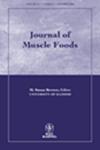CHANGES IN BIOCHEMICAL AND MICROBIOLOGICAL CHARACTERISTICS OF TURKEY SUCUKS AS AFFECTED BY PROCESSING AND STARTER CULTURE UTILIZATION
Abstract
ABSTRACT
The effects of starter culture and processing on the microbiological and biochemical characteristics of turkey sucuk were studied during production and storage. No differences (P > 0.05) in proximate composition and salt contents were found in sucuks produced either by traditional or heated methodologies. Both traditional (P < 0.05) and heat-processed (P > 0.05) sucuks that incorporated S1 had the lowest pH value, and thus the highest titratable acidity. Heating process resulted in about 1 log unit reduction in yeast counts and 1.5 log unit reduction in lactic acid bacteria, total mesophilic aerobic bacteria and micrococci–staphylococci counts of all sucuks. Within the heat-processed sucuks, heating stage did not result in a significant change in nonprotein nitrogen contents (P > 0.05). Changes in myofibrillar and sarcoplasmic protein were observed because of proteolytic changes during ripening, but, in general, no major difference was observed between sodium dodecyl sulfate-polyacrylamide gel electrophoresis patterns as a result of starter culture treatments.
PRACTICAL APPLICATIONS
Results of this study can be applied to improve some biochemical and microbiological characteristics of fermented turkey sausages. The findings showed that utilizing commercial starter culture mix, containing Lactobacillus sake, Staphylococcus carnosus and Staphylococcus xylosus II resulted in lower pH value with a higher titratable acidity than traditional style-fermented turkey sausages. These parameters are responsible for texture development and characteristic taste of fermented sausages.

 求助内容:
求助内容: 应助结果提醒方式:
应助结果提醒方式:


